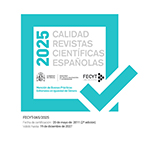The United States as a Kaleidoscope. An Essay on the Observations of Turn-of-the-Century Argentine Travellers and Diplomats
Abstract
From an analysis of four different Argentine intellectual and diplomatic figures of the late-nineteenth and early-twentieth century -Miguel Cané, Paul Groussac, Eduardo Wilde and Martín García Mérouthis article explores a series of different interpretations and worldviews of the dangers and challenges posed to Argentina by the gradual ascent of the United States as a continental hegemonic power, and the responses it aroused. The central purpose of the paper is to highlight the existence of diverse voices, interpretations and multiple discourses regarding this phenomenon, arguing that a sort of kaleidoscopic view of the United States emerged in Argentina. Hence, it seeks to review the assumption according to which Latin American anti-imperialism -and therefore its Argentine version- was dominated by a cultural and idealistic understanding of U.S. materialist culture. In particular, intellectual figures, such as Wilde and more importantly García Mérou, are two examples of the emergence of new optimistic interpretations about the ascendancy of the United States, developed in the context of concrete diplomatic experiences in that country and, thus, from inside perspectives.Downloads
Article download
License
In order to support the global exchange of knowledge, the journal Revista Complutense de Historia de América is allowing unrestricted access to its content as from its publication in this electronic edition, and as such it is an open-access journal. The originals published in this journal are the property of the Complutense University of Madrid and any reproduction thereof in full or in part must cite the source. All content is distributed under a Creative Commons Attribution 4.0 use and distribution licence (CC BY 4.0). This circumstance must be expressly stated in these terms where necessary. You can view the summary and the complete legal text of the licence.











